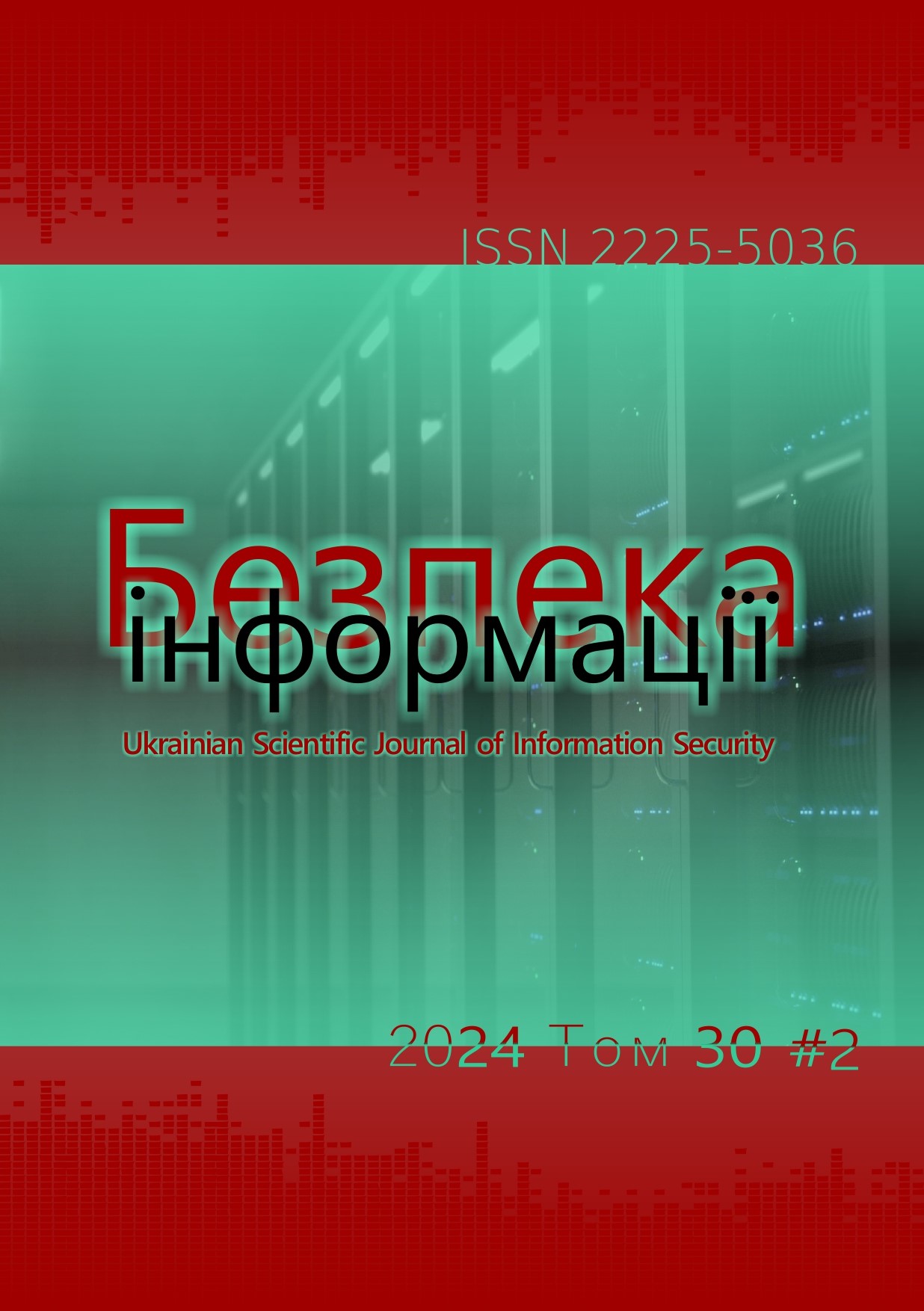UNCERTAINTY IN EVALUATING QUANTITATIVE QUALITY CHARACTERISTICS OF SOFTWARE
DOI:
https://doi.org/10.18372/2225-5036.30.19208Keywords:
software systems quality, posterior distribution, quality standards, critical sources of uncertainty, Bayesian methods, Bayesian updating, hybrid approachAbstract
Currently, software quality evaluation is a crucial stage in the processes of software development and implementation. It provides developers with the opportunity to obtain an objective assessment of the developed software products and determine their compliance with existing international standards and software quality evaluation requirements. However, this process is often accompanied by a certain level of uncertainty in evaluating the quantitative quality characteristics, which can complicate decision-making regarding the prospects for the use and safety of the developed product. Significant contributions to the theoretical and practical aspects of generalizing the issue of uncertainty in evaluating quantitative quality characteristics have been made by scholars such as S. Hayashi, M. Kubo, H. Mori, C. Areces, R. Fervari, A. Saravia, F. Velázquez-Quesada, S. Guaman, J. Alamo, J. Caiza, M. Nakamura, and others. The purpose of this article is to address the problem associated with the uncertainty in evaluating the quantitative quality characteristics of software systems. To achieve this goal, the article sets and solves the following tasks: examining various aspects of uncertainty in evaluating the quantitative quality characteristics of computer software systems; developing a methodological approach to solving the problem of uncertainty in evaluating quantitative quality characteristics; and conducting a practical study of the developed approach. The methods used to solve these tasks include analysis, synthesis, generalization, and comparison.
References
Areces, C., Fervari, R., Saravia, A. R., & Veláz-quez-Quesada, F. R. (2023). Uncertainty-based knowing how logic. Journal of Logic and Computation. https:// doi.org/10.1093/logcom/exad056.
Behera, D. (2023). Alternative methodology for epistemic uncertainty-based linear programming prob-lem. Soft Computing. https://doi.org/10.1007/s00500-023-08725-5.
Bougeret, M., Pessoa, A., & Poss, M. (2023). Single machine robust scheduling with budgeted un-certainty. Operations Research Letters. https://doi.org/10. 1016/j.orl.2023.01.007.
Boukhelifa, N., Johnson, C. R., & Potter, K. (2023). Visualization and decision-making design under uncer-tainty. IEEE Computer Graphics and Applications, 43(5), pp. 23–25. https://doi.org/10.1109/mcg.2023.3302172.
Cappelli, V., Cerreia-Vioglio, S., Maccheroni, F., Marinacci, M., & Minardi, S. (2020). Sources of un-certainty and subjective prices. Journal of the European Economic Association. https: // doi.org /10.1093/jeea/jvaa¬013.
Chandra Yadav, D., Singh, Y., Kumar Pandey, A., & Kannagi, A. (2024). Computerized software quali-ty evaluation with novel artificial intelligence approach. Proceedings on Engineering Sciences, 5(4), pp. 363-372. https://doi.org/10.24874/pes.si.24.02.019.
Clarté, L., Loureiro, B., Krzakala, F., & Zde-borova, L. (2023). Theoretical characterization of uncer-tainty in high-dimensional linear classification. Ma-chine Learning: Science and Technology. https://doi.org/10. 1088/2632-2153/acd749.
Guaman, D. S., Alamo, J. M. D., & Caiza, J. C. (2020). A systematic mapping study on software quality control techniques for assessing privacy in information systems. IEEE Access, 8, pp. 74808-74833. https:// doi. org/10.1109/access.2020.2988408.
Hahn, S.-J., & Lee, B.-H. (2023). Quality evalu-ation to small scaled software implementation result. The Journal of Korean Institute of Information Tech-nology, 21(1), pp.1-10. https://doi.org/10.14801/jkiit.2023.21.1.1.
Hayashi, S., Kubo, M., Mori, H., & Nakamura, M. (2023). Significance of quantitative eval-uation and assessment using automated volumetric breast density measurements software (Volpara Densi-ty). Nihon Nyu¬gan Kenshin Gakkaishi (Journal of Ja-pan Association of Breast Cancer Screening), 32(1), pp. 63-65. https://doi. org/10.3804/jjabcs.32.63.
Humphrey, W. S., & Singpurwalla, N. D. (1998). A bayesian approach for assessing software quality and productivity. International Journal of Relia-bility, Quality and Safety Engineering, 05(02), pp. 195-209. https: //doi.org/10.1142/s0218539398000194.
Indi, M. M., Priyangan, D. M., Herdiani, F. D., Budiman, B., & Mose, Y. (2023). Evaluation of the effectiveness of technology-based project management systems for software development. Global International Journal of Innovative Research, 1(2), pp. 175-181. https:// doi.org/10.59613/global.v1i2.30.
Kamaletdinov, S., Aripov, N., Khudayber-ganov, S., Bashirova, A. M., & Akhmedov, M. D. (2023). Evaluation of data quality based on Bayesian networks in railway rolling stock monitoring systems. E3S Web of Conferences, 460, 04014. https: // doi.org / 10.1051/ e3sconf/202346004014.
Kuetche, F., Noura, A., Ntsama, P. E., Welba, C., & Thierry, S. (2023). Signal quality indices evalua-tion for robust ECG signal quality assessment systems. Biomedical Physics & Engineering Express. https://doi.org/ 10.1088/2057-1976/ace9e0.
Kusuma, M. R., Windu Gata, Sigit Kur-niawan, Dedi Dwi Saputra & Supriadi Panggabean. (2023). Software defect prediction for quality evaluation using learning techniques ensemble stacking. Inspiration: Jurnal Teknologi Informasi Dan Komunikasi, 13(2), pp. 1-13. https://doi.org/10.35585/inspir.v13i2.58.
Liu, C. (2021). Quantitative evaluation of software component behavior discovery approach. IEICE Transactions on Information and Systems, E104.D(1), pp. 117-120. https://doi.org/10.1587/transinf.2020mpl0001.
Merzlyakova, E. Y., & Yanchenko, E. V. (2023). Review of software quality verification and evaluation methods. The Herald of the Siberian State University of Telecommunications and Informatics, 17(1), pp. 92-106. https://doi.org/10.55648/1998-6920-2023-17-1-92-106.
Pankov, P. S., & Tagaeva, S. B. (2020). Sys-tems of differential equations and computer phenome-na. Herald of Institute Mathematics of the National Academy of Sciences of the Kyrgyz Republic, (2), pp. 86-93. https:// doi.org/10.52448/16948173_2020_2_86.
Yoon, H. (2023). A quantitative evaluation for usability under software quality models. Interna-tional Journal on Recent and Innovation Trends in Computing and Communication, 11(3), pp. 24-29. https: //doi.org /10.17762/ijritcc.v11i3.6194.
Yue, C., Huang, R., Towey, D., Xian, Z., & Wu, G. (2023). An entropy-based group decision-making approach for software quality evaluation. Ex-pert Systems with Applications, 121979. https: // doi.org /10.1016/j. eswa.2023.121979.
Zhang, X., Li, Z., Zou, Z., Gao, X., Xiong, Y., Jin, D., Li, J., & Liu, H. (2023). Informative data selec-tion with uncertainty for multimodal object detection. IEEE Transactions on Neural Networks and Learning Systems, 1–13. https://doi.org/10.1109/tnnls.2023.3270159.
Zhao, J., Wang, Y., Mancenido, M. V., Chiou, E. K., & Maciejewski, R. (2023). Evaluating the impact of uncertainty visualization on model reliance. IEEE Transactions on Visualization and Computer Graphics, pp. 1-15. https://doi.org/10.1109/tvcg.2023.3251950.

